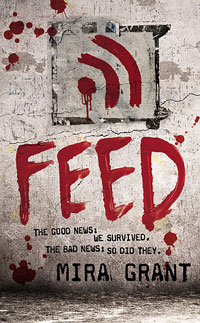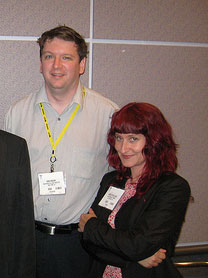Read This: Feed

What would it take for the blogosphere to replace the mainstream media as the average person most trusted news source? Mira Grant’s Feed has a simple answer to that question: The end of the world as we know it. Basically, the cures for cancer and the common cold come with an unintended side effect—an honest-to-God zombie uprising, which old media shrugs off as impossible, leaving frontline bloggers to inform the world about what’s really going on. Flash-forward twenty years, and bloggers across the country are forming loose network alliances and competing for ratings, and one trio, led by a young newshound named Georgia Mason, has been invited to tag along on a presidential campaign.
So Feed is a cross-country tour through a post-apocalyptic America with certain contemporary digital trends blown up to satirical proportions, punctuated regularly by zombie attacks. Some readers may not care for the abundance of world-building background-y passages; one of the reasons Feed is close to 600 pages (and it’s only the first in a trilogy) is that Grant spares very little detail in explaining how her fictional world got to the state it’s in. Others will find that they want to explore this world, that they enjoy seeing how all the pieces fit together. Meanwhile, you’ve got the relationship between Georgia and her reckless brother Shaun, and their growing realization that something is deeply, deeply wrong with this road to the White House—parts of the unfolding narrative are reasonably predictable, but Grant delivers some excellent surprises along the way. Given the completeness of this particular story, it will be interesting to see where she takes the two promised sequels: What else will she have to say about her zombie-ridden society?
9 June 2010 | read this |
Defending Publishing’s Future on Minnesota Public Radio
 (QUICK UPDATE: I just realized I can embed the audio for you!)
(QUICK UPDATE: I just realized I can embed the audio for you!)
Earlier today, I had the pleasure of a conversation with one of my favorite bloggers, Carolyn Kellogg of the Los Angeles Times book blog Jacket Copy, and Kerri Miller, the host of the Minnesota Public Radio show Midmorning. Our topic: “Is book publishing dying?“
This particular round of debate was kicked off by a recent New York Times op-ed by Garrison Keillor declaring that “book publishing is about to slide into the sea,” which provoked no little amount of sharp responses, including one from myself:
“Garrison Keillor is just the latest in a line of prominent Chicken Littles rushing to declare the sky is falling; at least this version has the added twist of ‘And the sky was so much better in my day, let me tell you, sonny.’ The fallacy in all these apocalyptic pronouncements is to confuse ‘publishing companies,’ especially the New York ones, with ‘the publishing industry.'”
It was a highly enjoyable hour—Kerri Miller asked great questions, as did several listeners, and Carolyn is always a delight to talk with—and I was pleasantly surprised to receive an email this afternoon from a Minnesotan who enjoyed the broadcast, referring me to a letter he’d written his local newspaper editor when Keillor’s apocalyptic patter first ran. “I don’t agree that the explosion of self-published books is necessarily a sign of literary Armageddon,” wrote Mark Munger. “And to lament the usurping of print media by the Internet, Kindle and the like is to ignore the reality of our own children. They have been steeped in the digital revolution. Much as Keillor and I might like to turn back the clock, it ain’t gonna happen.”
Now, granted, as the proprietor of Cloquet River Press, Mr. Munger has a dog in this hunt, but he’s on to something. Setting aside the “self-published” aspect for a second, one of the great advantages of smaller publishers is that they are capable of having smaller hits, which don’t need to appeal to as broad an audience, and that gives them creative freedom to distribute forms of literature that the Big Houses wouldn’t find “marketable,” because they aren’t geared towards marketing it. Now, when somebody who chooses to pursue publishing his or her own work takes advantage of the editing and design resources available to create a book with comparable “production values,” and invests both time and money into thorough marketing of that book to the right audience, success doesn’t seem quite so ridiculous. Is that a “threat” to big publishing? I don’t think it will be, any more than the current state of small, indepedent publishing is a threat. I see plenty of room for great books from a variety of sources, and the doom of bad books cluttering up the landscape is, perhaps, overrated. After all, we have plenty of bad books already, and that doesn’t seem to stop people from finding the good ones, and loving them, and telling other readers about them.
8 June 2010 | uncategorized |

 Our Endless and Proper Work is my new book with Belt Publishing about starting (and sticking to) a productive writing practice.
Our Endless and Proper Work is my new book with Belt Publishing about starting (and sticking to) a productive writing practice. 
